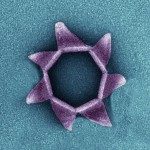Lien vers Pubmed [PMID] – 12107592
J. Mol. Evol. 2002 Aug;55(2):153-60
Among Bacteria the carA and carB genes encoding the small (CarA) and large (CarB) subunits of carbamoylphosphate synthase (CPS) have been lost in certain symbionts (Haemophylus influenzae) and in most obligate intracellular parasites (Chlamydiae, Spirochaetes, Mycoplasmatales, Rickettsiae) having genome sizes in the 0.7- to 1.1-Mb range. Compared to Bacteria, Archaea exhibit a more varied pattern of CPS gene losses and an unusual propensity to incorporate CPS genes derived from both Bacteria and other Archaea. Schematically they fall into three groups. Group 1 taxa (the crenarchaeon Aeropyrum pernix and the euryarchaea Pyrococcus horikoshi and Pyrococcus abyssii) lack CPS genes altogether. Group 2 taxa (comprising Halobacteriales, Thermoplasmales, Methanococcales, Methanomicrobiales, Archaeoglobales) harbor CPS genes whose encoded CarB and CarA subunit proteins are ostensibly bacterial in origin; that is, they are intermixed with bacterial homologues on a phylogeny of concatenated CarA and CarB sequences and are not distinguishable from bacterial sequences after searching for domain-specific amino acid residue positions. Group 3 taxa (the crenarchaea Pyrobaculum aerophilum, Sulfolobus solfataricus, and Sulfolobus tokodaii and the euryarchaeon Pyrococcus furiosus) harbor CPS genes whose encoded proteins appear to be archaeal: consistent with an archaeal origin, the CarA and CarB sequences in this group possess both unique signatures and signatures affiliating them to Eukarya. Based on the topology of the clade comprising the four Group 3 taxa, we argue that CPS genes of P. furiosus (a euryarchaeon) and those of the crenarchaea P. aerophilum, S. solfataricus, and S. tokodaii are of a single type, resulting from the two genes being laterally transferred from a crenarchaeon to P. furiosus.

